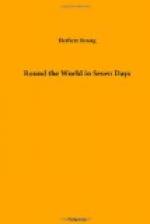For some time he flew up and down, but failed to distinguish a battered hull, a funnel, or any remnant of the vessel. It was plain that she had been entirely broken up. This was perplexing. He wondered how he was to discover the party, if they were yet alive. The island itself appeared, from his position off the shore, to be an impenetrable mass of forest. Flying in a little nearer, and going dead slow, Rodier presently caught sight of a square fenced enclosure within a few yards of the edge of the cliff. Smith steered directly over it, descending to a height of about fifty feet, and then saw in the middle of the space a long piece of navy tarpaulin, several biscuit tins, a hammer, two or three hatchets, and other objects, which only white men could have placed there. It flashed upon him in a moment that the shipwrecked party had encamped here. But there was not a human being in sight, and he felt a stabbing conviction that he had come too late.
Sick at heart, he made up his mind to descend and examine the place and its surroundings more closely. There was plenty of room for the aeroplane within the enclosure. Coming to the ground, he stepped, with Rodier, out of the car, each carrying his revolver. Now he saw, in addition to the articles before mentioned, a good number of arrows at various points, a few broken spears, a tomahawk of a rude kind. Here and there, on the barricade and below it, there were dark stains. These signs only increased his anxiety, but at the same time awakened wonder. Why had the party left their fort? It seemed scarcely likely that they had been overpowered in an assault, for there were no marks of a struggle within the barricade, and if the savages had succeeded in an attack they would certainly have appropriated all that they could lay hands on; even the most trivial objects would be precious to unsophisticated children of nature. Rodier suggested that the castaways had been taken off by some passing vessel, and Smith, catching at the hope, was beginning to accept this view, when, lifting the tarpaulin, he found beneath it the papers of the Albatross, some notebooks filled with jottings in his father’s spidery handwriting, and a few small cases that contained bits of rock, fossils, and other specimens dear to the geologist, each labelled with the name of the place where it had been found.
Smith was now thoroughly alarmed. He knew that his father, if he had quitted the place voluntarily, would never have left behind these fruits of his labours. Yet why was the fort deserted?




